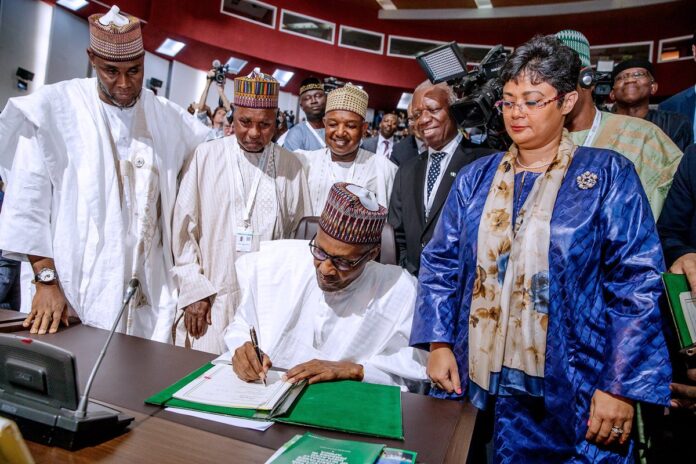African leaders on Saturday gathered virtually for an extra-ordinary Summit of the African Union (AU) to discuss the pending entry into force of the African Continental Free Trade Area (AfCFTA).
The Summit opened with a plea for a new treaty to aid women and small-scale enterprises to trade across borders ahead of the treaty’s entry into force in January 2021.
South African President Cyril Ramaphosa, the AU Chairman, said the entry into force of the AfCFTA marked the successful fulfillment of an African dream of a more united, prosperous and an integrated continent, trading with itself and harnessing its economic prowess.
“The treaty would improve Africa as an investment destination and a market of more than one billion people. This treaty (AfCFTA) is more critical than ever. It will expand the productive capacity of countries. To support this treaty, we must strengthen the place of women in the economy. We should consider an African Union protocol on women. This kind of protocol would be a catalyst to private enterprise in Africa,” President Ramaphosa said in his opening remarks.
Trading under the new terms across the 55 African Union member-states is expected to start in January 2021 following the move by some 34 African countries to notify the AU Commission of their passing of national laws recognizing the AfCFTA treaty, which allows cross-border trading.
“At its core is a developmental approach,” President Ramaphosa said in reference to the AfCFTA.
READ ALSO: AfCFTA: Nigeria’s Transport Sector Needs Overhaul
“It goes to the building of an infrastructure and a value chain for Africa. The AfCTA brings the promise of a new beginning. We reaffirm our optimism. The AfCFTA would help realize these opportunities by attracting more trade and more investment into Africa,” he stated.
At least 41 out of the 55 countries or customs territories have submitted their tariff offers, which include the common taxation arrangement covering incoming goods, raw materials, semi-processed and finished or industrial products.
The tariff offers have been submitted to the AU and the AfCFTA Secretariat, according to Wamkelle Mene, secretary-general of the Accra-based AfCFTA Secretariat.
Mene said the tariff offers allowing trading under the AfCFTA treaty had been received from members of the East African Community (EAC) and the West African Economic Community (ECOWAS).
Previously, it was impossible for different countries in different corners of Africa to trade with one another because of the inability to harmonize the various external taxation arrangements.
In East Africa, the Common External Tariff (CET) remains at zero, 10 and 25 per cent, which means raw materials required for processing of goods are allowed to move tax-free, but semi-processed goods are charged at 10 per cent while finished industrial products such as auto-spares are charged at 25 per cent.
“The treaty holds our collective aspirations for an integrated Africa. The countries of Africa laboured and toiled to lay the cornerstone. There is no doubt this will endure because it is built upon a foundation of unity of all nations,” President Ramaphosa said.
Addressing the Summit, Mene said the AfCFTA offered a tool for putting African economies on the right path to an economic system which did not rely on the colonial-era trade models, where African countries remained as exporters of raw materials and importers of finished industrialized goods.
Mene said the AfCFTA offered African countries an opportunity to redefine external trade by being able to rebuild a trading arrangement which was truly based on local economic relationships.
He said the local trading arrangements would benefit the local business enterprises.



